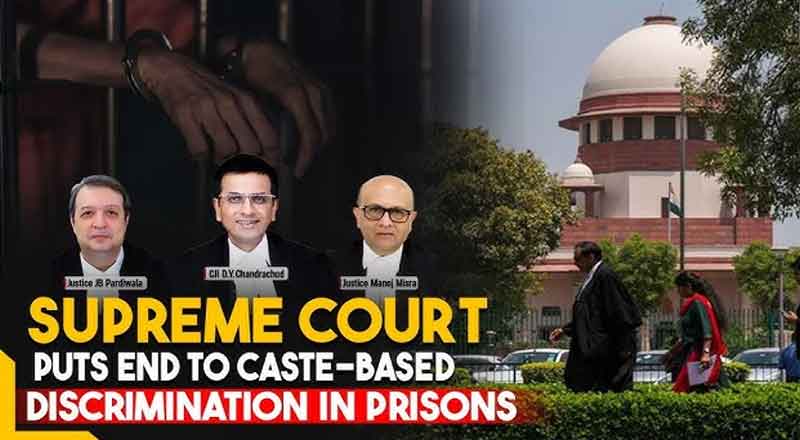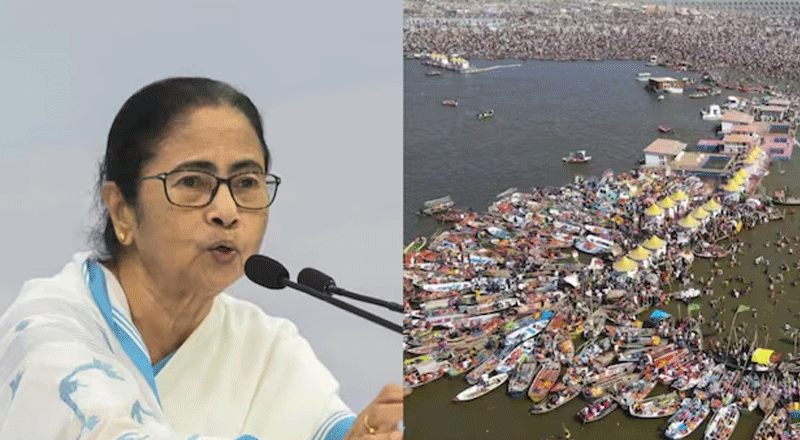The Significance of the Supreme Court’s Decision
In a transformative move for social justice, the Supreme Court of India has delivered a landmark ruling aimed at abolishing caste-based discrimination within the country’s prison system. This pivotal decision underscores the urgent need to address deep-seated social inequalities that persist within state institutions. By mandating the immediate revision of discriminatory provisions in state prison manuals, the Supreme Court reaffirms the constitutional principle that all individuals, regardless of caste, are entitled to equal rights and treatment. This ruling not only highlights the vulnerabilities of marginalized communities within the prison system but also reinforces the broader principle that no individual should endure discrimination, particularly in state-run institutions.
Condemnation of Caste-Based Practices
On Thursday, a bench led by Chief Justice D.Y. Chandrachud took a firm stand against the pervasive practices of caste-based segregation within prisons. The Court condemned not only the distribution of work assignments based on caste but also the assignment of inmates to different wards according to their caste identities. The directives issued by the Court to state authorities were clear and unequivocal: immediate changes must be made to eliminate these discriminatory practices that have long plagued the prison system.
This ruling arose from a petition filed by Sukanya Shantha, a resident of Kalyan, Maharashtra. She brought attention to the systemic discrimination entrenched in various state prison manuals. Notably, her petition referenced the Kerala Prison Rules, which create distinctions between habitual offenders and recidivists, as well as the West Bengal Jail Code, which assigns specific work tasks, such as cleaning, to certain castes. Such practices are not just a violation of the principles of equality but also a reinforcement of harmful social hierarchies that have no place in a modern justice system.
Mandates for Change
In its ruling, the Supreme Court directed that state prison manuals be amended within three months to remove all caste-based discriminatory practices. The Court explicitly prohibited the selection of inmates for cleaning duties or other labor based on caste, deeming such actions to be violations of substantive equality. It further condemned the assignment of hazardous tasks, like cleaning sewers, to certain prisoners based solely on their caste identity, labeling it as inhumane and unjust.
This ruling signifies a comprehensive approach to addressing the systemic discrimination that exists within the prison system. The Court’s order mandates that police and prison authorities actively work to combat caste-based discrimination and rectify any existing inequalities. This not only seeks to transform the environment within prisons but also serves as a broader call for societal change regarding caste dynamics in India. The implications of this ruling extend beyond prison walls, resonating with the ongoing struggle for equality in various facets of Indian society.
Implications for Prison Reform
The Supreme Court’s decision is seen as a significant step toward eradicating caste-based discrimination within the prison system, a domain often overlooked in broader discussions about social justice and reform. By emphasizing the need for fair and equal distribution of work among inmates, the Court has set a precedent for reforms that prioritize the dignity and rights of all prisoners.
Earlier this year, the Supreme Court sought responses from the Centre and 11 states, including Uttar Pradesh and West Bengal, regarding reports highlighting the existence of caste-based divisions and discriminatory practices in jails. The Court’s decision not only addresses immediate concerns about the treatment of prisoners but also catalyzes a wider reform movement aimed at ensuring that the principles of equality and justice permeate every level of the criminal justice system.
A Milestone for Caste Equality
This judgment marks a crucial milestone in the ongoing struggle for caste equality and human dignity in India. By reiterating that no individual should face discrimination, particularly in state-run institutions, the Supreme Court has taken a decisive stand against the perpetuation of caste-based injustices. This ruling not only seeks to change the conditions within prisons but also serves as a broader reminder of the work still required to achieve true equality in all aspects of society.
In the larger context, this ruling represents a critical turning point in India’s legal and social landscape. It challenges deeply entrenched practices and sends a powerful message that caste-based discrimination is incompatible with the values of a just society. As the nation grapples with the realities of caste dynamics, this decision serves as a beacon of hope, highlighting the possibility of reform and the urgent need to uphold the dignity of all individuals, regardless of their background. The Supreme Court’s ruling thus not only addresses the immediate issues within prisons but also reinforces the broader commitment to a more equitable society.
(With inputs from agencies)





